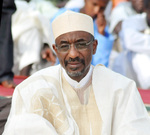Featured
Emir Sanusi: Why Boko Haram Thrives In Northern Nigeria

The Emir of Kano, Muhammadu Sanusi II, on Saturday urged Muslims in the North to adopt new approaches to address the social, economic and political challenges facing them.
Sanusi gave the advice in Kaduna at the 10th Annual Ramadan Lecture organised by VON, FRCN and NTA, with the theme: The Challenges of Muslim Ummah in the 21st Century.
He said that the region’s failure to invest in quality education and scholarship was partly responsible for its backwardness and rise of divisive groups like the Boko Haram.
The Emir observed that due to dwindling socio-economic situation in the region, majority of the people, particularly the youths have been left “without any hope in life”, and therefore, easy recruits into insurgency.
“If there is no future in a society, then Boko Haram ideas will thrive,“ he said.
The Emir advised political and religious leaders in the region to take a cue from other regions in the country and thrive to effect necessary changes.
“If Borno and Yobe were a country, they would be poorer than Niger, Chad and Cameroun. No wonder the Boko Haram crisis started there.”
Sanusi stressed the need for Muslims in the North regulate religious preaching and stop exposing their children to “quack Malams.”
He also advised parents to take “very serious interest in the activities of their children”, saying that the new media has radicalised alot of youths across the world and turned them into extremists.
“We need to watch what our children watch. If we do not give them the correct Islamic education, they will get the wrong one from somewhere else.”
He also challenged the Muslims to undertake a holistic change in their approach to socio-economic issues.
“We must not continue to allow culture to be dominant in our lives. We need to look at ourselves, reappraise our socio-economic approach to life.”
The Emir said Muslim clerics must take common stand on contemporary issues such as age of marriage in Islam, women education, rights and forced marriage, as well as modernisation and education generally.






